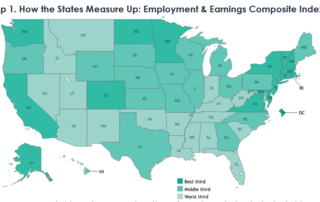Publications
The Economic Status of Women in the U.S. What Has Changed in the Last 20 – 40 Years
Heidi Hartmann, Ph.D. presents to the GAO.
The Economic Status of Women in the States
This Fact Sheet presents findings from analysis of the Employment & Earnings Index and Poverty & Opportunity Index of The Status of Women in the States series, a comprehensive project that presents and analyzes data for all 50 states and the District of Columbia.
The Status of Women in Lubbock County, Texas
This report provides critical data illuminating the status of women in Lubbock County, in terms of their civic engagement, health outcomes, vulnerability to poverty, and access to employment, education, and entrepreneurial opportunities.
The Economic Drivers and Consequences of Sex Trafficking in the United States
Like intimate partner violence, sexual assault, and stalking, human trafficking[i] has significant economic consequences for victims. While data on the prevalence of human trafficking in the United States are scarce, due to the covert nature of the crime, some research suggests that trafficking is widespread.
Violence Against Black Women – Many Types, Far-reaching Effects
Black women disproportionately experience violence at home, at school, on the job, and in their neighborhoods. The Status of Black Women in the United States details these many types of violence. Black women face high rates of intimate partner violence, rape, and homicide. Black girls and [...]
The Status of Black Women in the United States
This report aims to amplify the historical and current contributions of Black domestic workers to the broader domestic worker movement. Using available data, the report describes the experiences of millions of Black women across the United States, and offers recommendations where the opportunities for Black women can be realized.














